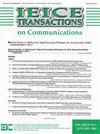考虑用户移动性的深度强化学习移动边缘计算系统资源分配
IF 0.7
4区 计算机科学
Q3 Engineering
引用次数: 0
摘要
移动边缘计算(MEC)是通过将云功能迁移到网络边缘来提供需要低延迟的服务的关键技术。当计算资源有限的移动用户将任务卸载到MEC服务器时,应该注意到无线信道的潜在低质量。为了提高传输可靠性,有必要在MEC服务器中进行资源分配,同时考虑当前信道质量和资源争用情况。有几项工作采用深度强化学习(DRL)方法来解决这种资源分配问题。然而,这些方法考虑的是固定数量的用户卸载他们的任务,并且没有假设用户数量会因用户移动性而变化。本文提出了基于虚拟机的MEC资源分配深度强化学习模型(DMRA-D),这是一种在线学习模型,用于解决用户数量变化情况下MEC服务器中的资源分配问题。通过采用虚拟状态/动作,dra - d保留状态/动作表示。因此,在操作过程中,无论用户数量的变化如何,dra - d都可以继续学习一个模型。数值结果表明,在用户数量变化的情况下,DMRA-D在继续学习的同时提高了任务提交的成功率。本文章由计算机程序翻译,如有差异,请以英文原文为准。
Resource Allocation for Mobile Edge Computing System Considering User Mobility with Deep Reinforcement Learning
Mobile edge computing (MEC) is a key technology for providing services that require low latency by migrating cloud functions to the network edge. The potential low quality of the wireless channel should be noted when mobile users with limited computing resources offload tasks to an MEC server. To improve the transmission reliability, it is necessary to perform resource allocation in an MEC server, taking into account the current channel quality and the resource contention. There are several works that take a deep reinforcement learning (DRL) approach to address such resource allocation. However, these approaches consider a fixed number of users offloading their tasks, and do not assume a situation where the number of users varies due to user mobility. This paper proposes Deep reinforcement learning model for MEC Resource Allocation with Dummy (DMRA-D), an online learning model that addresses the resource allocation in an MEC server under the situation where the number of users varies. By adopting dummy state/action, DMRA-D keeps the state/action representation. Therefore, DMRA-D can continue to learn one model regardless of variation in the number of users during the operation. Numerical results show that DMRA-D improves the success rate of task submission while continuing learning under the situation where the number of users varies.
求助全文
通过发布文献求助,成功后即可免费获取论文全文。
去求助
来源期刊

IEICE Transactions on Communications
ENGINEERING, ELECTRICAL & ELECTRONIC-TELECOMMUNICATIONS
CiteScore
1.50
自引率
28.60%
发文量
101
期刊介绍:
The IEICE Transactions on Communications is an all-electronic journal published occasionally by the Institute of Electronics, Information and Communication Engineers (IEICE) and edited by the Communications Society in IEICE. The IEICE Transactions on Communications publishes original, peer-reviewed papers that embrace the entire field of communications, including:
- Fundamental Theories for Communications
- Energy in Electronics Communications
- Transmission Systems and Transmission Equipment for Communications
- Optical Fiber for Communications
- Fiber-Optic Transmission for Communications
- Network System
- Network
- Internet
- Network Management/Operation
- Antennas and Propagation
- Electromagnetic Compatibility (EMC)
- Wireless Communication Technologies
- Terrestrial Wireless Communication/Broadcasting Technologies
- Satellite Communications
- Sensing
- Navigation, Guidance and Control Systems
- Space Utilization Systems for Communications
- Multimedia Systems for Communication
 求助内容:
求助内容: 应助结果提醒方式:
应助结果提醒方式:


